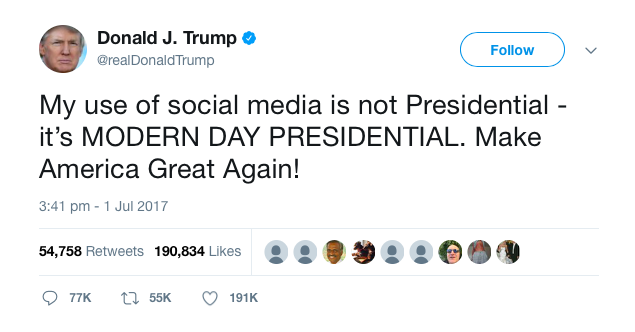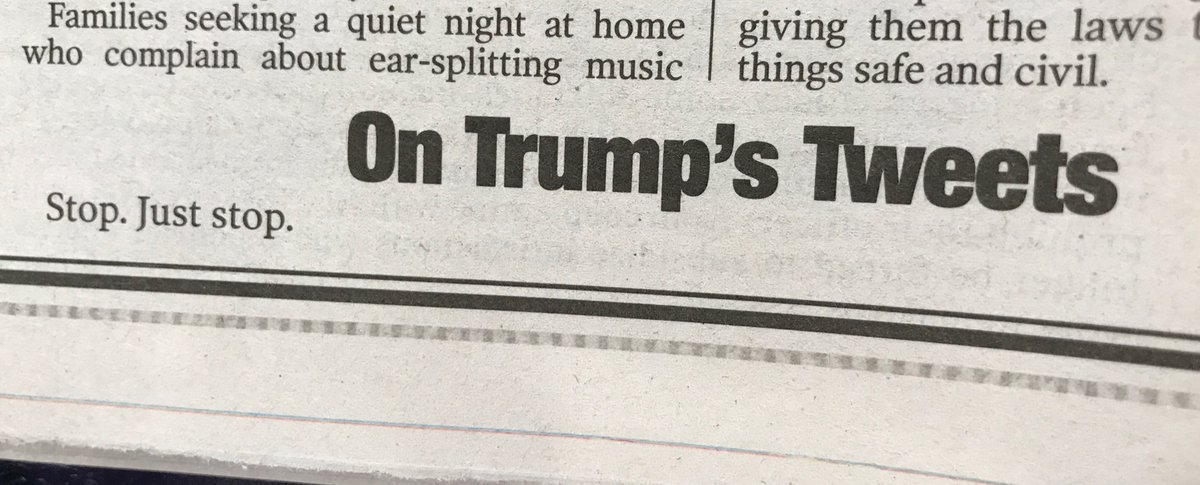Whatever else President Trump might be wrestling with this July 4th, his behaviour on Twitter has once again ensured that while he’s around, there will always be fireworks.
In yesterday’s Washington Post, Philip Bump traced the evolution of Donald Trump’s Fourth of July Tweets, from the innocent to the irritated to the plain incendiary.
But this holiday, the nation’s 45th President has been outdoing himself.
That he would decide to retweet something from, at best, a somewhat dubious source is hardly surprising anymore; that he would choose to distribute something as provocative as the mock beating of a “news organization” was seen as little short of incitement; as Robert Reich wrote, “mobilizing his supporters against media personalities and executives that are critical of him.”
The wrestling video, which by now has racked up more than half a million likes, came on the heels of an ill-tempered Twitter assault on the two co-hosts of Morning Joe – an NBC show that has long had a love-hate relationship with Trump, as both candidate and President.
Attacks on the media always play well with his base – the idea of an actual attack likely resonates even more with an even smaller core, as we saw during the campaign – and his defenders see these outbursts as fair play against a biased media and cultural elite perpetually ranged against him.
Since the recent shooting incident that injured Rep Steve Scalise, there has been a narrative among right-wing outlets, reinforced through Trump’s supporters on social media, that there is an “escalating pattern of violence and intimidation against Republicans.”
The furore over a recent New York production of Julius Caesar, along with remarks by Johnny Depp and a likely career-ending stunt by comedian Kathy Griffin probably haven’t helped convince them otherwise.
Into that charged atmosphere, meanwhile, dropped a provocative recruitment ad for the National Rifle Association.
Officially, the White House response to criticism of Trump’s Morning Joe tweets was that the President was simply “fighting fire with fire”, leading Stephen Colbert to respond: “He fights everything with fire. And first, he soaks all of us with gasoline.”
Maybe Trump has misunderstood what Teddy Roosevelt actually meant by the “bully pulpit” or has as some have argued, lost sight of the dignity of the office he occupies. Or maybe, as he tweeted, it’s merely a factor of how he believes it functions these days.

Yet juvenile and malicious as Trump’s tweets might be, they represent – admittedly at a level far escalated from anything we’ve yet seen from him – a classic political distraction technique.
And this may be the crux of the whole tawdry episode.
According to Rachel Maddow, Trump’s strategy is a “nuclear form of distraction” where, crucially, any potential reputational damage accrues not to him, but to his office.
In a remarkable opening segment to her show on Friday, Maddow said:
The thing he hurts is the Presidency, and by extension the standing of the United States of America. And if you’re a person who doesn’t really care about those things – someone who doesn’t think those things are all that valuable – someone who certainly doesn’t feel any responsibility for not only recognizing their value but upholding their value with your own behavior, then why not let those things take the hit? Why not let those things absorb the cost.
‘Let them eat cake’
Ten days from today, barring the always likely last-minute developments, President Trump will be in Paris to commemorate Bastille Day and perhaps demand a re-match in his handshake duel with President Macron.
Before that, though, he’ll have his first meeting since taking office with Vladimir Putin (and maybe even a last-minute visit to London, although it’s hard to imagine that Theresa May could be particularly overjoyed at such a prospect right now).
When Trump sits down with the Russian leader at the G20 meeting later this week, it will be against the backdrop of an intensifying inquiry into the extent of Russia’s interference in last year’s election and what we’re doing to prevent it happening again.
Meanwhile, the Senate looks set to vote on some form of healthcare legislation between returning from the July 4 break and leaving for the summer recess at the end of the month, but the wrangling between the various factions within the GOP is far from resolved.
In another example of an initiative that has stalled, now more than 40 states have refused to provide personal information on voters to the administration’s Commission on Election Integrity. Among the latest refusals, the Attorney General of Maryland said that the request “appears designed only to intimidate voters and to indulge President Trump’s fantasy that he won the popular vote.”
Talking of fantasies, Nasa even felt this week it had to officially deny rumours of a child slave colony on Mars.
Is it any wonder Buzz Aldrin was confused?
‘I’m President and they’re not’
This holiday weekend, as we ponder the history of the Republic, there’s little doubt the nature of the presidency has been – is being –
fundamentally altered. Whenever and however Donald Trump leaves office it will never be the same again.
David Remnick – in an excellent essay in the current New Yorker – writes:
Trump is hardly the first bad President in American history—he has not had adequate time to eclipse, in deed, the very worst—but when has any politician done so much, so quickly, to demean his office, his country, and even the language in which he attempts to speak? Every day, Trump wakes up and erodes the dignity of the Presidency a little more.
Even Bill Kristol, editor of the conservative Weekly Standard, tweeted that “The speed with which we’re recapitulating the decline and fall of Rome is impressive. What took Rome centuries we’re achieving in months.”
So, it’s fair to say America is distracted and divided this fourth of July.
The nation’s oldest Independence Day parade will take place today in the town of Bristol, Rhode Island, where it has been held since 1785.
A mere 225 years later, Slate magazine first ran a contest to summarise the Declaration of Independence in a single Tweet. Some of them have been little short of brilliant.
Then and now, even as the nation evolves around us, there are supposed to be enduring values and beliefs – beyond traditional imagery and phrases – timeless things that can command broad popular allegiance. In the current partisan atmosphere, it’s getting increasingly difficult to see precisely where there’s a rational, common ground for agreement any more.
The wrestling incident may be just one more instalment of the most compelling TV show ever to hit Washington, but the cumulative consequences for discourse and how we will conduct our politics from now on are very real. A new poll shows 70 per cent of Americans think the level of civility in Washington has gotten worse since the President took office. The same poll shows a fall-off in public trust of many of the nation’s institutions.
And maybe the worst part is that the toothpaste is out of the tube.
The anonymity and seeming impunity offered by social media has changed the pace and ferocity of political conversation, and we’re waiting for politics to catch up. We simply don’t want to believe our fellow citizens could be truly as nasty as they come across online. But sometimes we fear there’s just no escaping that conclusion.
In 1776, one of the timeless rallying cries of the fledgling nation was Patrick Henry’s exhortation “Give me liberty or give me death”.
Today, it’s probably “Don’t read the comments.”

One of the New York Post’s shortest-ever editorials, June 30
Also published on Medium.
